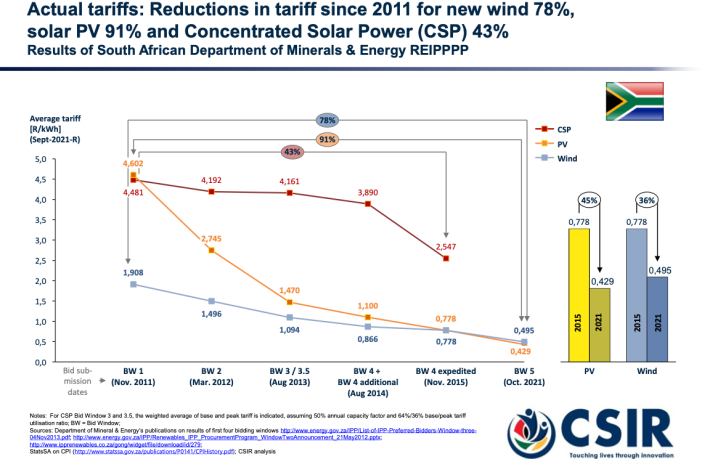- The Council for Scientific and Industrial Research (CSIR) welcomes the announcement of the preferred bidders by the Department of Mineral Resources and Energy (DMRE) in the fifth round of the Renewable Energy Independent Power Producer Procurement Programme (REI4P).
- The programme has seen sustained cost reductions, with the results confirming that renewable energy is the lowest cost alternative in South Africa in support of the decarbonisation of the power system and ensuring that electricity is cost-effective and sustainable
- The CSIR chart above shows that the average tariffs achieved under the REIPPPP since 2011 have fallen a dramatic 78% for new wind, from R1.90/kWh to 49.5c/kWh and 91% for solar PV, from R4.60/kWh to only 42.9c/kWh.
The DMRE’s announcement is guided by ongoing scientific research, with the CSIR being one of the key players involved in assessing a range of future energy-generation scenarios for South Africa and providing an evidence-based view of long-term power system expansion options. This research includes the analysis of decarbonisation scenarios to assess the options, costs and impacts of the accelerated decommissioning of ageing coal-fired power stations.
Related news: Preferred Bidders in South Africa’s Bid Window Round 5 Announced
The continued cost reductions of renewable energy options align with the CSIR’s modelling and analysis of the need for further renewable energy deployment to address the power system constraints, the debilitating impacts of load shedding and the decarbonisation of the energy system – which is a local and global imperative.
“The CSIR’s analysis has confirmed that South Africa is in a fortunate position to be able to transition to renewable energy sources as part of a least-cost power system. The Renewable Energy Independent Power Producer Procurement Programme outcome is aligned with our analysis of job creation opportunities and how renewable energy deployment can contribute towards economic growth and a just energy transition from coal to a blend of renewable energy complemented by energy storage and demand response,” says Dr Clinton Carter-Brown, CSIR Energy Research Centre head.
The CSIR also played a significant role through conducting Strategic Environmental Assessments (SEA) to improve the environmental planning for national wind and solar photovoltaic (PV) development. The CSIR’s role was to run a holistic assessment that incorporated a full range of relevant aspects, such as availability of wind and solar resources, environmental sensitivity, agricultural land-use, heritage and landscape features, socioeconomic development needs, grid connection, and technical and engineering suitability. In addition, the CSIR has conducted SEAs to support the responsible development of electricity grid infrastructure, such as transmission lines, at a national scale.
“The series of SEAs conducted by the CSIR has provided a well-informed basis for the responsible planning and development of renewable energy projects in South Africa,” says Paul Lochner, CSIR research group leader for environmental management services. “The SEAs provided a platform that brought together key stakeholders in a transparent process and improved the integration and quality of decision-making by the wide range of authorities involved.” He adds, “To conduct effective national-scale planning, it is important to understand the environmental issues at a project scale. Consequently, we are also involved at a project level with the renewable energy industry. In this latest set of preferred bidders announced from Bidding Window 5, the CSIR provided environmental assessment expertise to 11 of the 25 successful bidders.”
Author: GBA News Desk
Source: CSIR












1 Comment
Pingback: Wind turbines in South Africa: How popular is wind energy? - Green Economy Journal